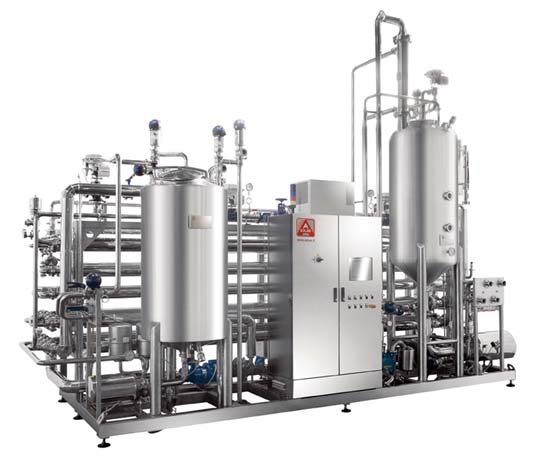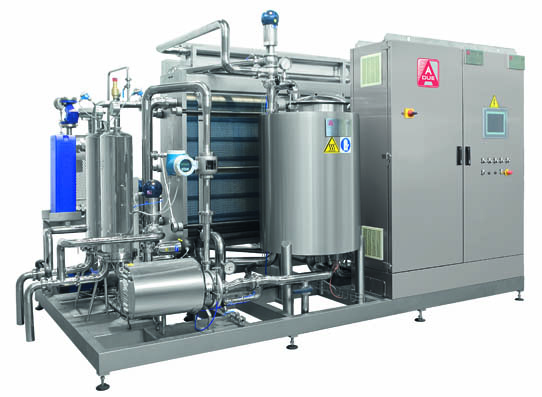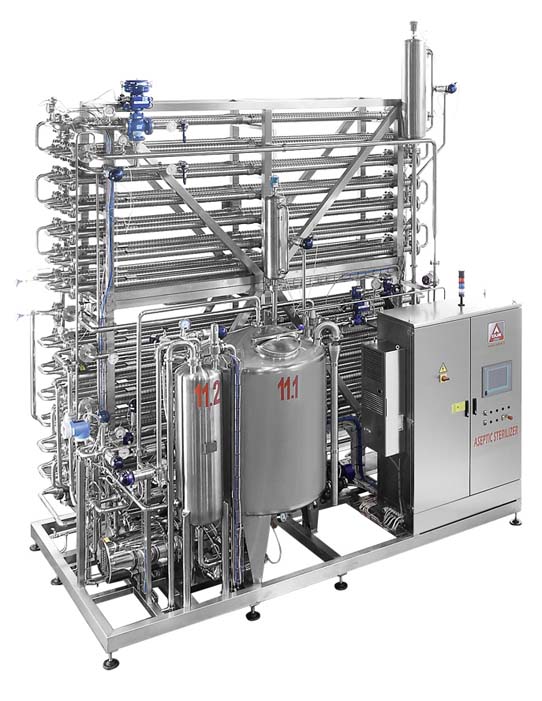A DUE designs and constructs pasteurization groups for finished syrup, finished drink, tea and tomato sauce, with a capacity ranging from 500 to 60,000 l/h, for cold, hot and aseptic filling.
The final beverages may necessitate an appropriate treatment in terms of chemical, physical and microbiological stabilisation that can include up to three distinct stages, such as: deaeration, homogenization and pasteurization.
A DUE studies, designs and manufactures the systems able to accomplish the above treatments, and in the specific case of pasteurization, can boast a portfolio covering a wide range of solutions in order to meet the most varied needs and requirements.
A DUE’s pasteurization groups include plate or tube heat exchangers. Thanks to the study of a special recirculation system it is possible to guarantee energy recovery of more than 90%.
A DUE’s pasteurization groups are also designed to better manage the surplus (ranging from 5% to 100%) coming from the filler.
Deareation consists of removing oxygen, which is the cause of harmful oxidation.
In the case of fruit juices, deareation improves the flavour, aspect and shelf life of the product.
In fact, the elimination of oxygen prevents the degradation of vitamin C, simplifies the filling process and prolongs shelf life of the product.
Homogenization consists of reducing and standardizing the size of the particles of fluid products in order to make them more stable and obtain a better taste and texture.
In fact, micronization reduces the weight of the particles, increasing their stability in suspension and avoiding their separation between the liquid phase and the solid phase.
In this way it is possible to reduce the use of emulsifying agents and additives.
The product is passed through a special homogenizing valve designed to generate pressure.
The energy associated with the fluid-dynamic effects that are created (turbulence, cavitation, acceleration, impact and cutting forces) allows micronization of the particles.
The use of high pressure homogenizers allows treatment of liquid products with dispersed or suspended particles of extremely variable dimensions, providing micronized particles with dimensions in the range of 0.4- 1 micron.
Pasteurization consists of the microbiological stabilization of product through special heat treatment.
Correct pasteurization also reduces the preservatives that are necessary to ensure the product’s shelf life.
The microbial load in fruit drinks is related to the raw materials (contamination of the fruit and vegetables because of the ground, dust and cleaning water), the environment (confined air, structures, climatic factors, moulds/yeasts, insects) and process hygiene (collection, transport, cleaning, transformation).
The main contaminating microorganisms are yeasts and moulds, but there may also be bacteria (acetic acid, lactic acid and spore-forming). Pathogenic microorganisms are rarely found in juices and soft drinks because of the acidity.
EASY.ThermP – PLATE PASTEURIZER
EASY.ThermP
Pasteurisation units for simple syrup, final syrup, finished drink and fruit juices.
Suitable to treat non-carbonated and/or carbonated beverages, clear or with fibres of small size and a low content.
Suitable for all types of filling technologies: cold, hot and ultra clean.
Nominal production capacity: 500 ÷ 60.000 l/h.
Holding Time accuracy: ± 5%.
Pasteurization temperature adjustable via operator interface. Tolerance: ± 1°C.
Outlet temperature adjustable via operator interface. Tolerance: ± 1°C.
Energy Recovery up to 90% (cold filling process).
Plate types: standard and “free flow”.
Can be integrated with vacuum deaerators complete of aroma recovery, homogenizers and saver tanks.
Water & Energy saving.
Should a tunnel cooler for containers be installed downstream, the full integraton with additional thermal recovery is ensured.
EASY.ThermT – TUBULAR PASTEURIZER

Pasteurisation units for final syrup, finished drink, fruit juices.
Suitable to treat viscous product containing small chunks, pulps and fibres.
Suitable for all types of filling technologies: cold, hot and ultra clean.
Nominal production capacity: 500 ÷ 60.000 l/h.
Holding Time accuracy: ± 5%.
Pasteurization temperature adjustable via operator interface. Tolerance: ± 1°C.
Outlet temperature adjustable via operator interface. Tolerance: ± 1°C.
Pipe type: smooth surface, corrugated, double wall corrugated, embossed tubes.
Design: tube-in-tube and multi-tube.
Can be integrated with vacuum deaerators complete of aroma recovery, homogenizers and saver tanks.
Water & Energy saving.
Should a tunnel cooler for containers be installed downstream, the full integraton with additional thermal recovery is ensured.
EASY.ThermA – ASEPTIC PASTEURIZER
EASY.ThermA
Sterilization units for finished drink (non-carbonated beverages, isotonic drinks, fruit juices and nectars) to be aseptically filled.
Systems suitable to treat viscous product containing small chunks, pulps and fibres. Combined systems for two-step-filling “double shot” (liquid & solid phases).
Suitable for all aseptic filling technologies.
Nominal production capacity: 500 ÷ 60.000 l/h.
Holding Time accuracy: ± 5%.
Sterilization temperature adjustable via operator interface. Tolerance: ± 1°C.
Outlet temperature adjustable via operator interface. Tolerance: ± 1°C.
Time to be ready to fill will be within 2 h.
Energy Recovery up to 90% (PHE cold filling process).
80% recovery of the steam used during the sterilization phase.
20% reduction of the product losses during the water pushing phases.
Positive differential pressure control in each step.
Can be integrated with vacuum deaerators complete of aroma recovery, homogenizers and aseptic tanks.
Water & Energy saving.



